Waste not, want not.
Depression-era children, now seniors, grew up hearing that refrain. Now, they're living it as recipients of Meals on Wheels (MOW) of Bennington County, Vermont. This progressive senior nutrition program transforms gleaned food from local farms, the Vermont Foodbank, and regional grocery stores to produce farm-to-table meals that rival food served in the finest restaurants.

This isn't your typical Meals on Wheels program. It wouldn't be possible - given the minimal government funding which only covers approximately half the cost of each of the 50,000 meals it serves each year - without using donated food. In fact, 80% of the food served is donated -- and might have been wasted if not for MOW.
Using fresh, local ingredients to cook meals from scratch, MOW Bennington is nourishing thousands of area seniors, both the homebound and those able to access community meal sites near their homes. The innovative Bennington Café serves lunch daily, with a choice of entrees. It has become the popular spot for men and women of a certain age who want to remain active and independent as long as possible.
"There is an untapped wealth of usable, yet unsellable, food here in Southern Vermont," notes Susan Fox, Executive Director of MOW Bennington, who is retiring in October. "Incorporating this donated and re- captured food, especially fresh fruits and vegetables, has increased the nutritional content of our meals and reduced waste in the food system."
Fox and her kitchen staff, including Marin Iwashko, a Culinary Institute of America-trained chef, adjudicated adults learning cooking skills, and volunteers, take everything from heirloom tomatoes with small bruises to artisanal cheese end runs to make healthy - and delicious -- meals. These meals crowd out unhealthy eating behavior by offering a 3+-course meal with up to six portions of fruits and vegetables.
The MOW Bennington model is a timely solution from both a social and environmental perspective. Vermont recently passed Act 148, a Universal recycling law requiring businesses and residents to redirect their waste, including food suitable to feed people. When food scraps end up in landfills, they release methane gas, which contributes to climate change.
Fresh, Local (Mostly Donated) Ingredients Replace Processed Food
Many MOW programs throughout the country rely on processed food, due to financial and time constraints. With just 5 paid cooks and 170 volunteers, Mow Bennington produces 50,000 meals annually, using nearly 80% donated and recaptured food.
The program has developed a reputation for using what would otherwise be wasted. Donations large and small are welcomed. It is not uncommon to kind several cases of apples by the back door, or a small bag with several extra squash from a local gardener. "Using donated food challenges our staff to think creatively, using seasonal ingredients," adds Fox.
The cafe introduces Seniors to types of food they are unfamiliar with. Think: organic tomatoes, artisanal lettuces, and vegetarian entrees with ingredients like tofu and quinoa.
"With the expansion of the Vermont food waste programs (food rescue), we are able to feed seniors and others in the community twice as much food as they would otherwise receive," notes Ilsa Svoboda, incoming Executive Director. "We are fortunate to be part of such a wonderful opportunity creating new partnerships to better serve our clients."
Primary Nutritional Resource for Seniors
While many nutrition programs focus on babies and children, Meals on Wheels is the primary nutritional resource for Seniors. Its goal is to alleviate malnutrition and isolation - too often the plight of seniors - by offering services that allow seniors to remain independent, living in dignity regardless of their income level. Unfortunately, these programs are chronically underfunded. Donated food is a solution that makes sense from a financial, food quality and environmental perspective.
Many Seniors are unable to afford such luxuries as fresh fruits and vegetables. The cost at local farmers markets is far beyond their reach. The abundance of donated bread, fruit and yogurt is shared with participants as a supplement to their regular meals.
Last year, because of illnesses and a myriad of health problems, Gloria Vanderzee, an 84-year-old woman, who describes herself as "cultured," has had many meals delivered daily. "I look forward to what's on the menu every day. The veggies are fresh - things like kale, tomatoes, zucchini, and sweet potatoes. Fresh fruit - a banana (potassium) or an orange (Vitamin C) - Delicious!"
For many home-bound seniors, their daily Meals on Wheels delivery is their only source of human contact. For some, it's their only way to eat fresh, hot meals.
One long-term Bennington resident in her late 60s and who lives alone, can no longer cook for herself. Before she received Meals on Wheels deliveries, she ate only cold food. "Having an actual hot dinner is a treat for me and necessary for my health," she notes. "The good food is helping me put on much needed weight."
Community Meal Sites: Antidote for Isolation
For those able to travel short distances, Community Meal sites offer an opportunity to socialize, reducing the isolation that often comes when a senior has lost his or her spouse of many decades.
Allan Siegel is totally independent, at age 68, having moved to the Bennington area to live near his grandchildren. He wanted to meet people his own age. "I discovered the Bennington Café, where I could get a vegetarian meal at a great price." As a vegetarian, Siegel appreciates the entrees choices, always with a vegetarian option. He has been coming to the Cafe almost every day for months, and now volunteers in the kitchen.
MOW Bennington takes its mission seriously striving to feed area seniors the healthiest food possible. The farms around Southern Vermont, including neighboring Washington County, boast fertile farmland, with local farms producing produce and vegetables that are often sold at farmer's markets in Manhattan and Brooklyn.
Thanks to MOW's innovative approach to redirecting food waste, Vermont Seniors now enjoy delicious healthy meals like the most fortunate foodies in NYC.
co-written with Susan Fox, Executive Director of MOW-Bennington. Food Consultant. Chef. Passionate about solving hunger for the food insecure through the use of recovered food. Believes that access to wholesome food and dignified dining experiences should be available to everyone.


